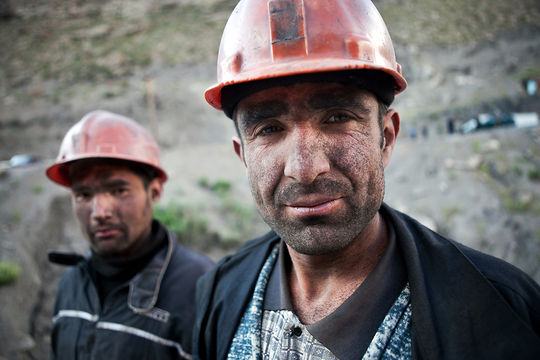[captionpix align=”center” theme=”elegant” width=”600″ imgsrc=”http://natoassociation.ca/wp-content/uploads/2013/06/r-CENTERRA-GOLD-KUMTAR-KYRGYZSTAN-PROTEST-large570.jpg” captiontext=” Protesters stormed a Canadian-owned mine in Kyrgyzstan prompting the government to declare a state of emergency in the area. (AP Photo/Abylay Saralayev)”]
Recently, protests erupted at the Kumtor mine in Kyrgyzstan as locals who have long had concerns about the mine’s impact blocked roads and cut power to the operation. The unrest has spread to the south, where nationalist protestors have recently taken over buildings in the southern city of Jalalabad and demanded the release of recently detained southern politicians. Given that the current President is a northerner, there is potential for southern, Kyrgyz elites to use this unrest as an opportunity to weaken the government and destabilize the country.
Kumtor, operated by Canadian company Centerra, is the largest Western mine in the Central Asian region. Although service was eventually restored in the mine, this case highlights a growing trend of security problems stemming from Canadian mining practices abroad. Troubles with Canadian mines overseas are not new. In the past few years, Canadian companies’ expansion into locations overseas has increased the likelihood of corruption and fraud.
Specifically at Kumtor, nearby residents have voiced concerns about premature births among locals and damage to livestock. There is also the question of cyanide contamination in the Central Asian water supply, already stressed by a troubling Soviet environmental legacy.
While the government is likely to diffuse the crisis, a lasting solution will come from comprehensively addressing the concerns of local populations and governments. It will also require addressing the epidemic of corruption that keeps patronage networks strong in the country. Among the potential rewards is greater stability in a country which hosts the Manas air base, an essential transit and supply point for ISAF forces engaged in Afghanistan. Not addressing the unrest in the former Soviet republic, however, will open up opportunities for elites to de-stabilize an essential NATO ally, for their own benefit and at NATO’s cost.
Precarious politics
[captionpix align=”right” theme=”elegant” width=”300″ imgsrc=”http://natoassociation.ca/wp-content/uploads/2013/06/20130316_ASM901.png” captiontext=” Economist.com”]
Northern politicians dominated Kyrgyzstan until the Tulip Revolution in 2005 when southerner Kurmanbek Bakiyev came to power. Following the 2010 overthrow of Bakiyev, violence broke out against ethnic Uzbeks in the southern city of Osh. In the wake of the violence, some southern nationalist leaders have suggested the violence they incited was retaliation for the overthrow of their patron Bakiyev.
The seizure of government buildings in the south is reminiscent of June 20102010, when the provisional government asked minority Uzbek leaders to remove pro-Bakiyev supporters from a government building in the city. Stoking the fires of this minor confrontation, nationalist Kyrgyz elites exploited the situation for their political goals. Within a month nationalist Kyrgyz forces had mobilized to rampage through Uzbek neighbourhoods. Over a few days in, there were hundreds of murders and rapes, thousands of homes burnt and hundreds of thousands displaced, mainly ethnic Uzbeks.
In terms of political importance, the issues at Centerra’s mine have the potential to become a firestorm, and for good reason. The Kumtor mine is the largest taxpayer in a country of 5.5 million people, where total state revenues in 2012 were just $1.741 billion USD. By comparison, the Canadian government had revenues of $679.3 billion in the same year. Centerra itself has significant resources too; in 2011 it saw revenues of just over $1 billion before falling to $661 million in 2012. Nationalist politicians argue Kumtor’s payments are not enough and have proposed nationalizing the operation.
Clan networks funded by corruption
Nationalizing the mine could be asking a fox to guard the henhouse, and will not break the hold that clans have on Kyrgyz politics. Even if Canadian mining companies are paying their fair share of taxes, there’s no guarantee the money is getting to the average Kyrgyz citizen. As a whole, Kyrgyzstan is wrestling with a corruption pandemic that is keeping its informal clan networks alive. As in many former Soviet countries, it is common for elites to use their positions in government or business to distribute favours in exchange for political loyalty which, in 2010, was used in the past to incite violence against ethnic Uzbeks.
Transparency International ranks the country 154th out of 176 through its Corruption Perceptions Index (2012) and the World Bank places it in the 13th percentile of its Control of Corruption rankings (2010). The problem touches on all levels, as officials like the minister responsible for Kyrgyzstan’s major hydropower retailer and producer, Elektricheskiye stansii, reportedly embezzle close to $40 million a year.
Stability through transparency
Given elites’ power comes from their ability to distribute money, jobs and resources to their followers, shutting down off-the-books cash flow could help. Canadian companies working in Kyrgyzstan and other countries in a similar political situation should support efforts to keep resources away from clan leaders who exploit the countries’ problems for their own gain. The best way to do this is by pushing at home and abroad for more transparent resource extraction and government in countries where Canadian mines operate.
While the Canadian government has lagged in their commitment to addressing this issue, the private sector can lead the way in securing the future of countries where they operate.Many companies recognize the obvious benefits of such a move, yet there are those who are reluctant. All Canadian companies operating abroad need to throw their full weight behind transparency programs like the Extractive Industries Transparency Initiative. They can pressure the Canadian government to make it a foreign policy priority and voice their support of transparency initiatives.
More transparent governance will lead to a better use of resources and more effective delivery of government services. This will make the government better able to alleviate poverty and make citizens feel more secure, easing tensions between ethnicities. Most importantly, it will reduce the power of nationalist politicians to incite violence in the south, which threatens national and regional security. If Canadian companies are willing to take the long-term view and speak out against corruption in the countries they operate in, they can be leaders in securing the future of an important NATO ally in Central Asia.




